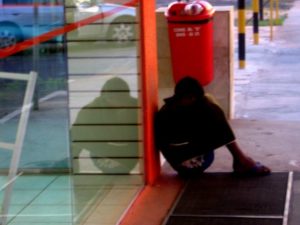 HOUSTON, Texas — City council members in Houston, Texas have passed an ordinance that bans homeless people from erecting temporary shelters and tents on public property or panhandling on the public streets.
HOUSTON, Texas — City council members in Houston, Texas have passed an ordinance that bans homeless people from erecting temporary shelters and tents on public property or panhandling on the public streets.
The new rules also ban the homeless from blocking sidewalks or entryways to buildings.
According to reports, the ordinance was presented after area residents complained about aggressive panhandling and other activity on the street, which they found to be a public safety hazard. Some also opined that the encampments detract from the desired image of the city.
“I am pleased that we are addressing this important public safety issue in our city,” council member Mike Knox remarked. “Panhandling in streets is dangerous to both panhandlers and motorists.”
The city says that it would prefer to see the homeless be housed in area shelters, and has been in communication with non-profit organizations such as the Salvation Army and Star of Hope to determine if there are sufficient beds to meet the need. Star of Hope plans to have over 200 beds available in August when it opens its new facility on the city’s south side.
“The whole notion is to strike a balance between addressing their needs and their concerns and putting them in a better position in their lives, and at the same time the neighborhood concerns in terms of people being in their doorway or blocking the sidewalk,” Mayor Sylvester Turner told the Houston Chronicle.
Turner is seeking to house an estimated 500 chronically homeless citizens by the fall, and is also considering building “low level” shelters under overpasses and on private property. He has also asked area landlords to consider providing assistance in instances when they have vacant rental units.
“We are prepared and want to assist people in getting to a better spot in their lives,” he said. “By passing this ordinance, the tents, they’re not allowed, [and] items that won’t fit in a three-by-three-by-three [container are] not allowed, but we are willing and will continue to work to put people in a better place.”
But Tristia Bauman, a senior attorney for the National Law Center on Homelessness and Poverty, expressed concern over the ordinance, stating that it unfairly punishes those who are facing hard times.
“This law as written is constitutionally concerning, and I think it’s very vulnerable to legal challenge,” she remarked to reporters. “To create a punishment for people who are attempting to survive on the street when they have no alternative is a violation of the Eighth Amendment prohibition on cruel and unusual punishment.”
“I see some effort in the way the ordinance is drafted that officers are taking the first step to get people services. It’s a great gesture, but it’s just not enough,” Trisha Trigilio, an attorney with the ACLU of Texas, also told the Houston Press. “If there’s not enough beds for people to sleep in, it’s unconstitutional for them to be punished for it.”
One couple also appeared before city council to testify that when they found themselves homeless, a church helped them get a tent, which provided a safe place to store their belongings while they searched for employment.
“Because we had a tent, I’m no longer homeless,” the wife, only identified as Mrs. Proctor, stated. “You’re toting your life in a bag when you’re homeless. You literally tote your life in a bag. And you can’t leave it somewhere, because the city will throw it away. You cant get a job when you’re toting your life in a bag either. How do you go to a job interview when you have two suitcases and five backpacks?”
The encampment ordinance will go into effect in 30 days and is stated to still allow people to sleep outside if desired.
Become a Christian News Network Supporter...


